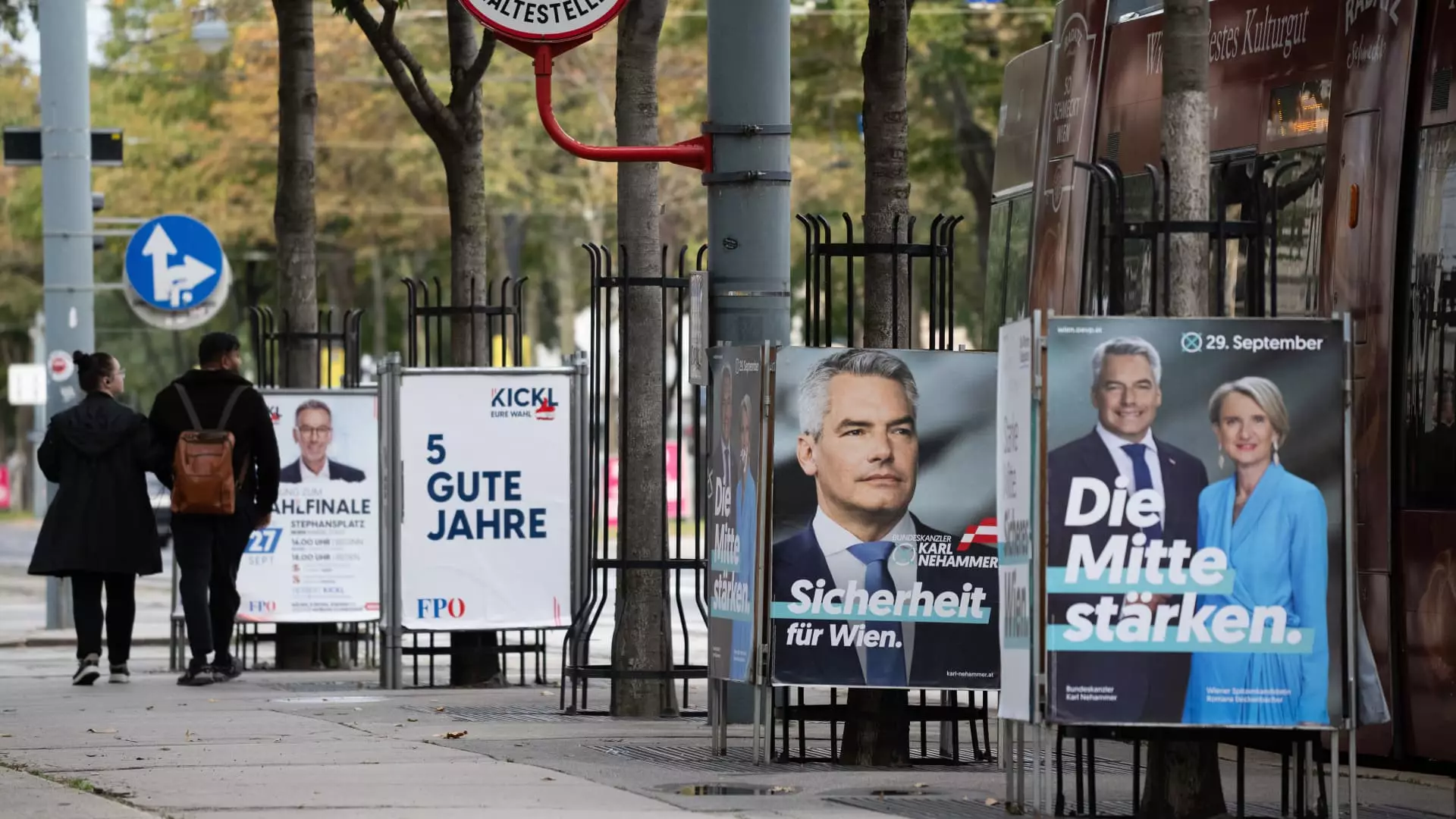The recent electoral outcome in Austria has unveiled a striking shift towards the far-right, as the Freedom Party (FPÖ) makes a significant resurgence in the political arena. With the party’s leader, Herbert Kickl, at the helm, this election result serves as a bellwether not just for Austria but for Europe as a whole. As the continent grapples with rising populist sentiments, the implications of this election could potentially alter the political landscape, inviting scrutiny of both domestic and international governance.
Projections following the recent election indicate that the FPÖ has secured approximately 29.1% of the vote, overshadowing the ruling conservative Austrian People’s Party (ÖVP), which garnered around 26.2%. Meanwhile, the Social Democratic Party of Austria (SPÖ) trails with a somewhat distant 20.4%. This electoral performance signals a remarkable rebound for the FPÖ, especially after its downturn in 2019 marked by corruption scandals. While the FPÖ may celebrate its victory, it is essential to recognize that a significant challenge lurks ahead: forming a cohesive government. The party will likely face hurdles as the prevailing opposition parties have categorically dismissed the prospect of forming alliances with them.
This electoral outcome echoes a wider trend observed across Europe in recent months: extremist political factions have been gaining traction while moderate parties appear to falter in the current political climate. This shift may lead Austria into a period of uncertainty as political entities jockey for position and deliberation persists over potential coalitions.
The FPÖ’s Ideological Underpinnings
Herbert Kickl’s leadership of the FPÖ comes with profound ideological implications—ones that deserve critical assessment. Kickl, a figure who has been controversially labeled “Volkskanzler” (People’s Chancellor), evokes a historical resonance that many may find alarming, as it draws parallels to darker chapters of the past, notably that of the Nazi regime. Despite the party’s efforts to distance itself from these historical connotations, the FPÖ’s roots in nationalism and anti-immigrant sentiment cannot be overlooked.
Furthermore, the party’s policy proposals suggest a troubling trajectory for Austria’s immigration framework. Kickl advocates for a program of “remigration,” which outright calls for deporting migrants portrayed as “unwanted strangers.” This rhetoric and proposed legislation align closely with alarming trends of xenophobia and nationalist policies that have manifested across various European nations. The FPÖ capitalizes on the ongoing migration crisis accentuated by international conflicts, interlinking a narrative that equates migrants with societal strain.
Not only does the FPÖ represent a shift in domestic policies, but its potential governance poses risks for Austria’s international relations as well. The party’s alliance with Russian President Vladimir Putin and its opposition to European sanctions against Russia highlight an overt tilt from the European Union’s mainstream policies. Calls for cutting support to Ukraine echo a rising trend of skeptical attitudes toward Western engagements in geopolitical conflicts. Such moves could seriously jeopardize Austria’s historically neutral stance—a position that has long facilitated its function as a diplomatic mediator and influencer on the European stage.
This development may also rekindle broader debates around Europe’s relationship with Russia and the West. As the FPÖ escalates its narrative against European unity in response to the war in Ukraine, the implications for European politics at large demand careful contemplation. In a continent already fraught with political divides, the FPÖ’s ascendance signals a growing challenge to solidarity among EU member states.
While the FPÖ revels in electoral gains, the path to governance may remain rocky. The party will need to traverse a difficult landscape marked by resistance from other political factions, most of whom have promised to avoid collaboration with far-right entities. Even among traditional allies like the ÖVP, inclination towards an alliance is currently absent, as Chancellor Karl Nehammer has publicly ruled out any potential coalition with Kickl’s party.
The dilemma Austria faces echoes a wider European phenomenon: as the far-right advances, creating stable coalitions becomes increasingly complex, challenging the fabric of traditional politics. The outcome of the election is indeed a call to action for centrist and left-aligned parties, urging them to reposition their strategies in response to shifting public sentiments.
Austria’s shift towards a far-right electoral landscape embodies broader trends occurring throughout Europe, significantly affecting both domestic governance and international relations. As the implications of this election unfold, all eyes will remain glued to how this evolving political narrative impacts not just Austria, but its standing within the larger European context.


Leave a Reply